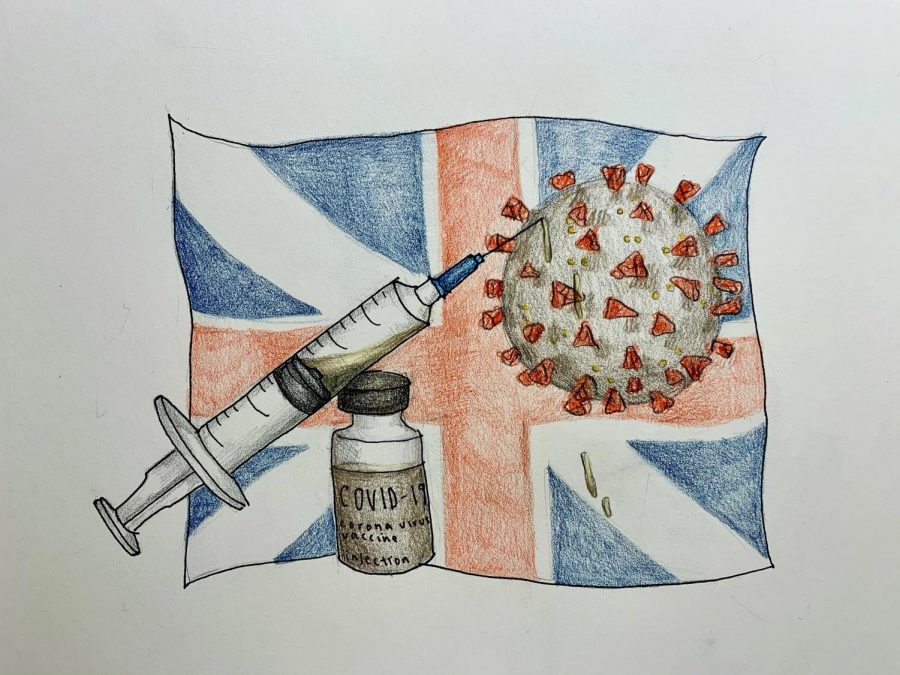COVID-19 Pandemic: Will Vaccines Be The Solution?
February 9, 2021
On December 2, 2020, the United Kingdom officially became the first Western nation to authorize a Covid-19 vaccine, a monumental step towards recovery amid the coronavirus pandemic. Around the globe, cases have continued to grow rapidly, but with the first doses of the vaccines being registered across the country this week, Health Secretary Matt Hanock claims that “Help is on the way”[1].
Specifically, emergency authorization was only granted to US pharmaceutical company, Pfizer, and its German partner, BioNtech. After concluding phase 3 of clinical trials, the results showed a 95% efficacy rate in preventing further infection while causing no serious safety concerns. Compared to other vaccines that usually take years to complete, this one only took around eleven months to fully develop.
Although the process has been faster this time around, scientists that have conducted numerous clinical trials and intensive studies confirmed that “no corners have been cut”[1] in developing the vaccine.
Eager to use this acquired technology to their advantage, the UK has already ordered 40 million doses of the vaccine. Health secretary, Matthew Hanock, claims that throughout the first week of December, an initial 800,000 doses would be delivered from Pfizer’s facilities in Belgium to the UK: they also plan to register millions more before the new year approaches.
According to the UK’s priority list for the vaccines that currently have, vaccines will be first targeted towards the elderly who are above the age of 50 and are residents, and those in care homes; the older the age, the more essential it is to give the vaccine. At a news conference, BioNTech CEO Sahin claimed that in merely seven days of getting a second dose, there would be full immunity to Covid-19. The UK is only starting to roll out their first dose of vaccines, yet prime minister Mark Drakeford already hopes “that the next one will follow soon”[4].
Along with the vaccine that Pfizer and BioNTech are collaborating on, other vaccines are being developed at the moment. The four main categories that all the potential vaccines fall under are mRNA, vector, protein subunit, and whole killed vaccines. The newest approach, being mRNA vaccine, is exactly what Pfizer and BioNTech are going to employ; the vaccine uses a piece of single-stranded genetic material called messenger RNA to prompt the body itself to make synthetic pieces of the coronavirus genetic material and stimulate an immune response. Since mRNA is very fragile, the vaccine must be kept at an extra low temperature, around minus 94 degrees Fahrenheit (minus 70 degrees Celsius). Precautions in the storage of the vaccine have been taken to make sure that while transporting the vaccine, it stays intact.
Along with being authorized in the UK, Pfizer and BioNTech also submitted their candidate to the FDA to get approval. Moderna is another vaccine being developed, and they are awaiting approval from multiple countries as well. By Spring of 2021, vaccines are planned to become available in large quantities at even pharmaceutical centers, with millions of patients being vaccinated daily.
With the UK moving to administer the vaccines, and the US preparing to do so by pre-ordering millions, these vaccines may be the solution to this pandemic. So far, the UK has shown a commendable effort in the process of vaccinating patients. The global death toll is towering over 2 million, but countries such as the UK and the US are determined that the vaccine will slowly set things back to the norm.
[1] https://www.cnn.com/2020/12/02/uk/pfizer-coronavirus-vaccine-uk-intl-hnk/index.html
[2] https://www.nytimes.com/2020/12/02/world/europe/uk-covid-vaccine-pfizer.html
[3] https://www.nytimes.com/2020/09/30/nyregion/indoor-dining-nyc.html
[5] https://www.bbc.com/news/health-51665497


Varsha Bhargava • Feb 24, 2021 at 10:27 am
You did a great job of condensing a very BIG topic into a really concise and informative article that’s digestible for the reader! Thank you for educating everyone on such a relevant topic in the world! Keep up the great work 😀